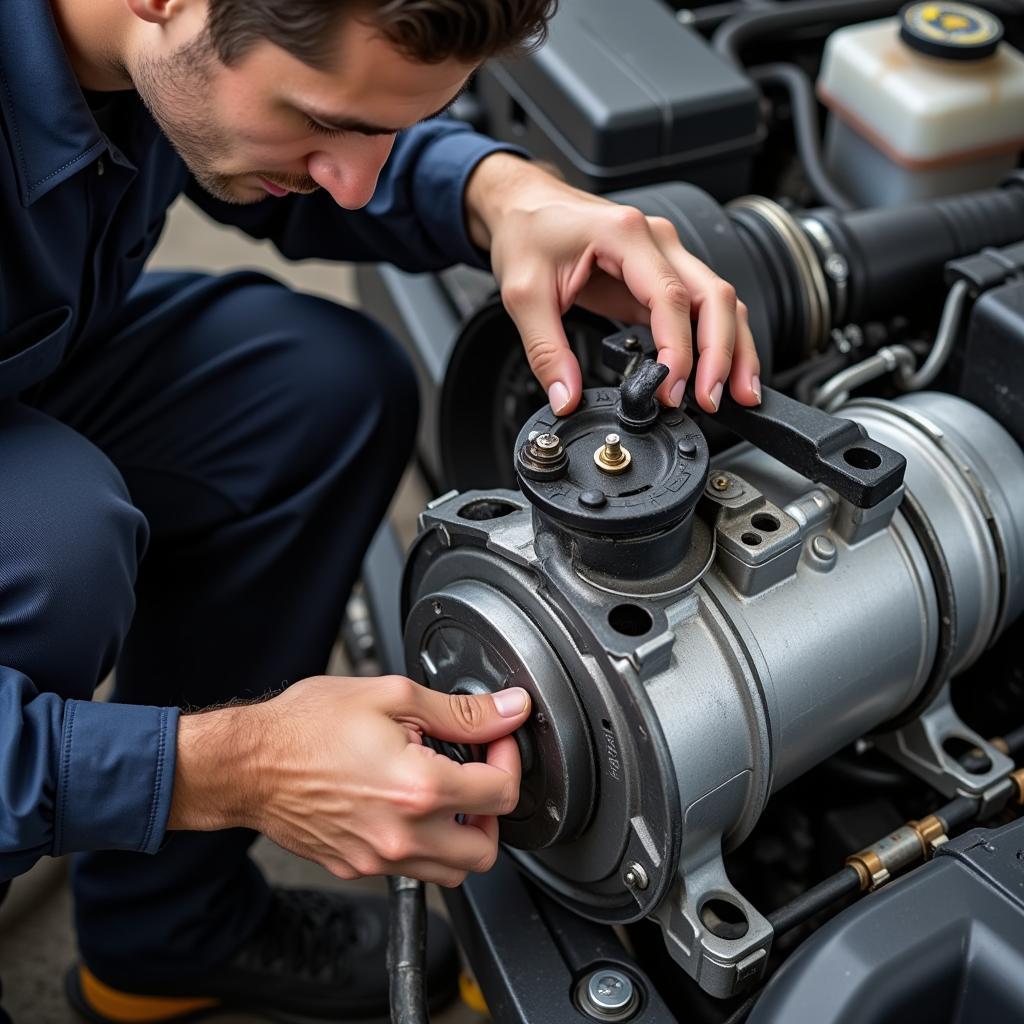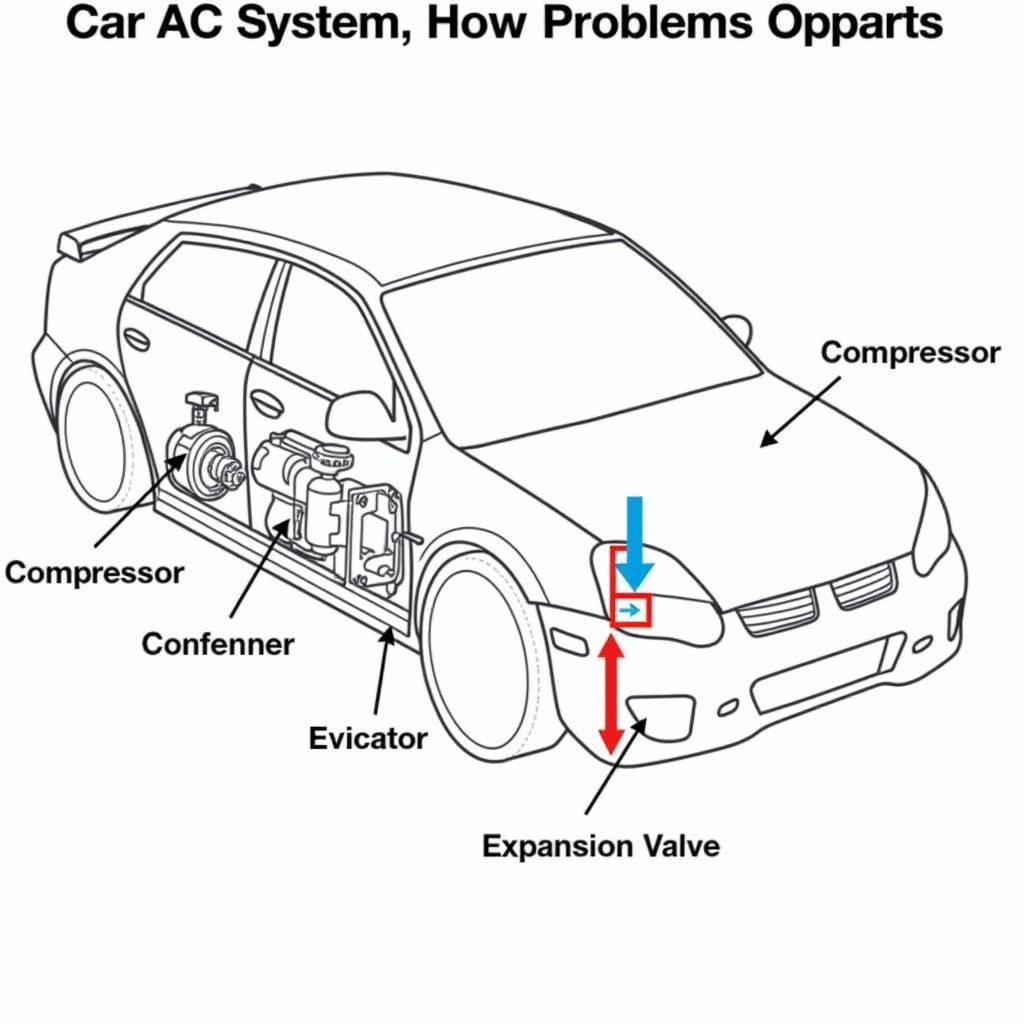Car air conditioning problems can be a real pain, especially during hot summer months. A malfunctioning AC system can make your commute uncomfortable and even dangerous. This guide will help you diagnose and potentially fix common car AC problems, saving you time and money.
Similar to how to fix car ac problems, many issues can be resolved with simple troubleshooting.
Common Causes of Car AC Problems
Several issues can lead to a malfunctioning AC system. These range from simple fixes like a blown fuse or low refrigerant to more complex problems requiring professional attention. Some of the most common culprits include leaks in the system, a faulty compressor, or electrical issues.
Diagnosing the Problem: Where to Start
Before you start tearing apart your dashboard, it’s essential to systematically diagnose the problem. This will help you narrow down the potential causes and avoid unnecessary repairs.
- Check the Fuse Box: A blown fuse is one of the easiest fixes. Locate your car’s fuse box (usually under the dashboard or in the engine compartment) and check the fuse related to the AC system. If the fuse is blown, replace it with a fuse of the same amperage.
- Feel the Air: Is the air coming out of the vents lukewarm or not cold at all? This could indicate low refrigerant.
- Listen for Unusual Noises: Strange noises coming from the AC compressor, such as clicking or grinding, could indicate a problem with the compressor clutch or other internal components.
- Check for Leaks: Look for signs of refrigerant leaks around the AC components, such as oily residue or a sweet smell.
Low Refrigerant: A Common Culprit
Low refrigerant is one of the most frequent causes of poor AC performance. Over time, refrigerant can leak out of the system, leading to reduced cooling capacity. You can purchase AC refrigerant recharge kits to try and fix this yourself, but it’s recommended to take your car to a certified technician to have the system properly diagnosed and recharged. This will ensure there are no leaks and that the correct amount of refrigerant is added. Learn more about how to fix ac compressor car.
Recharging the System: DIY or Professional?
While DIY recharge kits are available, recharging the AC system yourself can be risky if done incorrectly. Overcharging can damage the system, and if there’s a leak, the refrigerant will simply leak out again. A professional technician has the right tools and expertise to diagnose the problem accurately and recharge the system correctly.
Electrical Issues: Troubleshooting Tips
Electrical problems can also cause AC issues. These can range from a faulty relay to a wiring problem.
- Check the AC Relay: The AC relay is a small electrical switch that controls the power to the AC compressor. A faulty relay can prevent the compressor from engaging. Locate the AC relay (consult your owner’s manual) and swap it with a known good relay to see if that solves the problem.
- Inspect the Wiring: Inspect the wiring leading to the AC compressor and other components for any signs of damage, such as fraying or corrosion. Repair or replace any damaged wiring.
If you’re struggling with your car’s AC clutch, the article on how to fix ac clutch car can provide valuable insight.
 Inspecting the Car AC Compressor for Damage and Leaks
Inspecting the Car AC Compressor for Damage and Leaks
Faulty Compressor: Signs and Solutions
The AC compressor is the heart of the AC system. It compresses the refrigerant, allowing it to circulate and cool the air. A faulty compressor is a more serious issue and often requires replacement.
Identifying a Bad Compressor: Key Indicators
- No Cold Air: If the air coming out of the vents isn’t cold at all, even after checking the refrigerant level, the compressor might be the culprit.
- Loud Noises: Loud clicking, grinding, or whining noises coming from the compressor are often signs of internal damage.
- Compressor Clutch Not Engaging: If the compressor clutch isn’t engaging, the compressor won’t be able to compress the refrigerant.
 Diagram of a Car’s Air Conditioning System
Diagram of a Car’s Air Conditioning System
Other Potential Problems
Besides the common issues mentioned above, several other problems can affect your car’s AC performance. These include:
- Clogged Cabin Air Filter: A clogged cabin air filter can restrict airflow, reducing the effectiveness of the AC. Replacing the cabin air filter is a simple and inexpensive fix. For more details, see will a cabin air filter fix my car ac probmem.
- Faulty Thermostat: A faulty thermostat can also affect the AC’s performance. If the thermostat is stuck open, the engine might not reach the optimal temperature for the AC to function correctly. Find more information at will a new thermostat fix ac problems in my car.
- Blocked or Leaky Condenser: The condenser is located in front of the radiator and helps release heat from the refrigerant. A blocked or leaky condenser can reduce the AC’s efficiency.
 Cleaning a Car’s AC Condenser
Cleaning a Car’s AC Condenser
Conclusion
Troubleshooting car AC problems can be challenging, but by following this guide, you can identify and potentially fix some common issues. Remember, always prioritize safety and consult a professional technician for complex repairs. If you’re still experiencing issues, feel free to contact us at AutoTipPro. Our phone number is +1 (641) 206-8880 and our office is located at 500 N St Mary’s St, San Antonio, TX 78205, United States. We’re here to help you get your AC back on track and stay cool on the road.




Leave a Reply